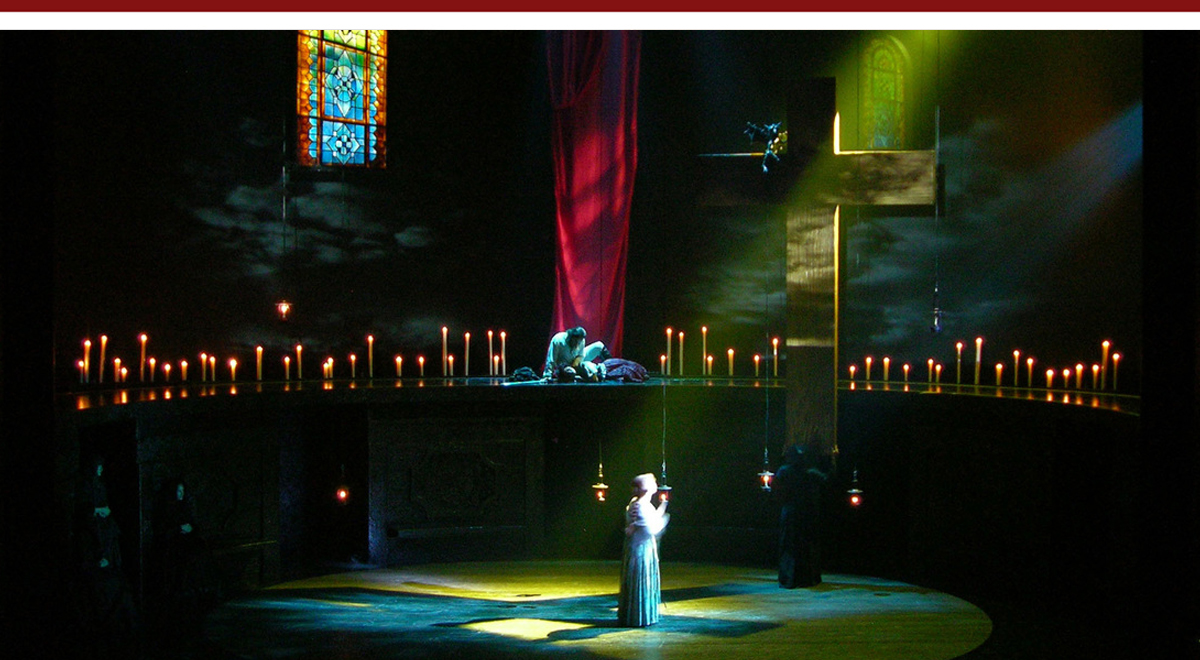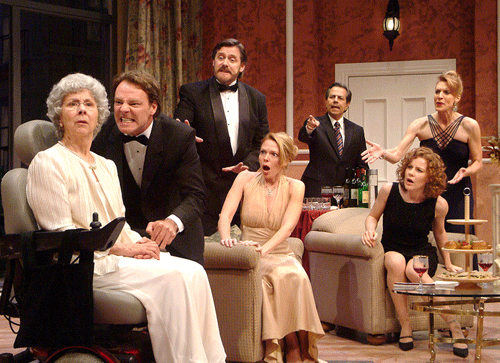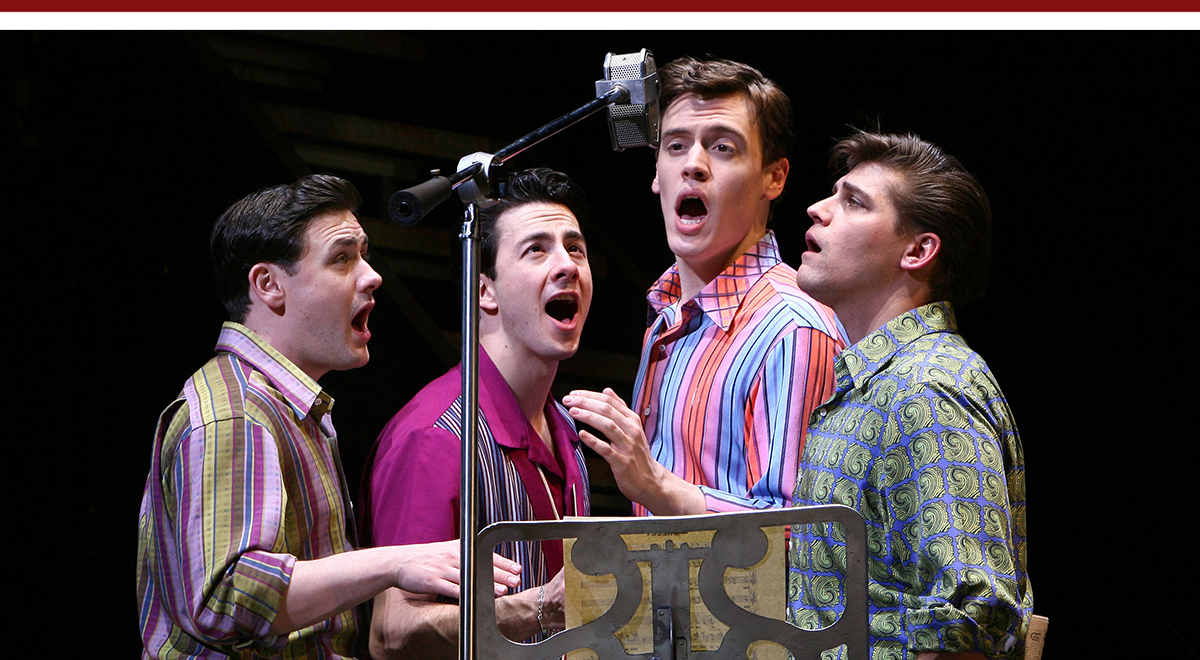JUNE 2007
Click title to jump to review
CARMEN by Stephen Sondheim and John Weidman | La Jolla Playhouse
JERSEY BOYS by Jaston Williams, Joe Sears and Ed Howard | Ahmanson Theatre
THE VERDI GIRLS by Deborah Brevoort | Laguna Playhouse

Seduced by surfaces
By merging electronica, exotica and, for a show in Las Vegas, erotica into tried and true circus acrobatics, French-Canada’s Cirque du Soleil franchise conquered America in the late ‘80s and early ‘90s. Carmen, a new musical theater piece directed by one of Cirque’s creative talents, promises in its La Jolla Playhouse premiere (through July 22 in the Mandell Weiss Theatre) to apply some of that magic to Prosper Mérimée’s 1845 novella of the seductive Gypsy woman.
Carmen's life and love can be drawn by adaptors to make her a mere libertine or a ground-breaking liberator. This helped inspire numerous interpretations from an inane ice skating show to an immortal opera by Bizet. Anyone fearing that visual pyrotechnics and bicycle-riding contortionists will overshadow Mérimée’s story in La Jolla needn’t worry. That actually would be a nice problem to have. Instead, the visuals, while always appealing, thanks primarily to Christopher Akerlind’s evocative lighting design, are not nearly enough to compensate for a night of prosaic dialogue, uninspired lyrics and simplistic music.
In fact, the show sadly falls between the genres of musical theater and high-energy Cirque entertainments. One wonders if the creators – Sarah Miles (book and choreography), composer John Ewbank, lyricist AnnMarie Milazzo and director Franco Dragone – arrived at pre-production with designs for a show that would be filled with the kind of mysterious imagery and effects that bookend the show. Perhaps regional theater realities pruned a lot of great ideas. What remains is left wanting the very element that was never essential to Cirque success: language.
Set in Spain, the story’s characters are in three basic groups – soldiers, local women, and the men and women of the gypsy camp. Don José Narvarro (Ryan Silverman) is a happily married man off to become a career soldier. He moves through the ranks exhibiting a gentle goodness that does not compromise his strengths as a leader and fighter. Despite being surrounded by seductive townswomen – and there is a visual feast of physical beauty on stage – José can only think of his wife. Until he encounters Carmen (Janien Valentin). Then he cannot seem to remember her. The room-clearing power of obsessive love is what drives José, the story, and the lingering appeal of this tale 160 years after it was written. Passion will lead to fleeting moments of joy for Jose, but more often to random bouts of violence, jealousy, betrayal and murder.
Valentin and Silverman look and sound great. Their voices are powerful and supple enough to occasionally transcend the mundanity of their songs. But their acting is not able to elevate the dialogue to drama.
There are highlights. José leads the arrested Carmen by rope until she turns the tether into a seduction cord and a wild Apache dance ensues that turns the table on who is bound and who remains untied. Neal Benarai, as Zuniga, delivers a rock opera moment in "Touch the Sun," a spirited performance and tune that evokes Superstar’s "Damned for All Time." And, the chorus numbers are occasionally fiery enough to entertain. But for most of the evening the show never rises above the heat and depth of an Ann-Margret routine on "The Ed Sullivan Show."
It’s hard to fathom this vessel being made see-worthy, with the book, lyrics and music as intrinsically dull as they are. It may have been built for Broadway, but it may go direct to Vegas, where a trimmed down 90-minute version, with showgirls and boys pounding out dramatic Flamenco, will surely help a late-night house of out-of-towners forget their own encounters with seductive fates at the gaming tables.
top of page
CARMEN
book by SARAH MILES
music by JOHN EWBANK
lyrics by ANNMARIE MILAZZO
LA JOLLA PLAYHOUSE
June 5-July 22, 2007
CAST Neal Benari, Genson Blimline, Iresol Cardona, Gabriel Croom, Noemi Del Rio,Maria Eberline, Tony Falcon, Jacqui Graziano, Shannon Lewis, Jorge E. Maldonado, Michelle Marmolejo, Rocio Ponce, Caesar Samayoa, Marcos Santana, Carlos Sierra-Lopez, Ryan Silverman, Shelley Thomas, Janien Valentine, Victor Wallace, Natalia Zisa
PRODUCTION Klara Zieglerova, set; Suzy Benzinger, costumes; Christopher Akerlind, lights; Francois Bergeron, sound; Sarah Miles, choreography; Omayra Amaya, Flamenco specialist; Roque Banos, Spanish Music Consultant, Phyllis Schray, Justin Mabardi, Jenny Slattery, stage management.
Christopher Akerlind's lighting was a highlight
Nicholas Hohn
Pop rocks
Before music videos, when pop tunes were audio only, they nested in our imaginations with images and references gathered from the host brain. This heightened the intimacy of the songs and piqued our interest in the singers hidden behind the radio grills and dust jackets. That paradox, and a superbly slick production, help explain the popularity of ‘Jersey Boys, The Story of Frankie Valli & The Four Seasons’ (with its national tour now lodged at L.A.’s Ahmanson Theatre through August 31). It also explains why this may be a one-generation phenomenon.
While millions of Boomers can sing every word of Four Seasons’ hits like "Walk Like a Man," "Big Girls Don’t Cry," "Sherry," "Oh, What a Night" and "Can’t Take My Eyes Off You," few can name every group member. Revealing who they are and how they got where they are keeps this from being a billion-dollar Broadway tribute concert.
Book writers Marshall Brickman and Rick Elice have fun putting the story in a non-threatening environment: Damon Runyon meets the Brill Building rather than Goodfellas hit the Mean Streets (which is probably closer to the truth). Even with the R-rated language it feels kid-friendly, with an appeal to adolescence through projections inspired by comic book panels. A four-part, spring-summer-fall-winter storytelling structure gives each member his own Rashomon voice and overlays their business lifecycle onto the annual cycle of the seasons. We get to see the members as individuals and as parts of a professional family. It’s the ties that bind them that are the group's defining quality, even beyond the music.
The first version of the story comes from Tommy De Vito (Deven May), who recalls spotting the young Frankie Valli (Christopher Kale Jones) and bringing him into a bar band with his younger brother Nick (Miles Aubrey). All three will spend time in jail, reminding us that the Bad Boy roots of rock didn’t begin with rap. (Although it was something the ‘60s stars preferred to hide.) Valli will reform, but Nick will return, and the band will replace him with a talented Nick Massi (Michael Ingersoll) on bass.
They’ll go through what seems an eternity looking for an identity until they find Bob Gaudio (Erich Bergen), a teenager songwriter who already has a credit for one minor hit. These become the Four Seasons (apparently drummers came and went), with Valli’s falsetto their signature sound and Gaudio’s songwriting their insurance for success. The final piece in the puzzle will be their association with Bob Crewe, credited as lyricist for all the hits in Jersey Boys, but seen in the show as advisor and producer.
Director Des McAnuff, who in some ways started the phenomenon by turning The Who's Tommy into a Broadway money-machine, keeps things spinning throughout Jersey Boys. Even the changing of Klara Zieglerova’s set pieces feel exciting. The performers exhibit great range. The women move from lithe chorines to serviceable actors, providing girlfriends and wives, while the men portray heavies one minute and back-up musicians the next. (Special marks to Jackie Seiden as Valli's first wife, who helps enliven Brickman's sharpest dialogue in a scene when the future spouses meet.)
There’s enough staging substance to disguise the fact that it's a show of fairly juvenile AM love songs. The story too, for all its dramatic potential, has been kept safe, never too threatening. The big moment, in which band members uphold a sense of honor to each other even as things are falling apart, is less awe-inspiring than "ah-that's-nice" inspiring.
That may be the ultimate tribute to the Jersey boys. The real danger and roughness of what they went through is beyond Broadway. Similarly, the character and uniqueness of Valli’s voice is beyond the pale of a Broadway singer (except for a rarity like Tim Curry). As good as Jones is, and he's very good, he's trained for power and purity, not personality. The Four Seasons' versions still have the edge, and that renews the audio versions' lease in our memories. Even now that we've come to know the men behind the music.
top of page
JERSEY BOYS
book by MARSHALL BRICKMAN
& RICK ELICE
music by BOB GAUDIO
lyrics by BOB CREWE
music direction, vocal arrangements, incidental music
RON MELROSE
directed by DES McANUFF
AHMANSON THEATRE
May 25-August 31, 2007
Opened, rev'd 6/3
CAST Erich Bergen, Michael Ingersoll, Christopher Kate Jones, Deven May, and Miles Aubrey, Erik Bates, Douglas Crawford, Sandra DeNise, Jennifer Evans, Rick Faugno, Eric Gutman, Nathan Klau, Brandon Matthieus, Jackie Seiden, Courter Simmons, Taylor Sternberg, Melissa Strom, with John Altieri and Joseph Siravo
PRODUCTION Klara Zieglerova, sets; Jess Goldstein, costumes; Howll Binkley, lights; Steve Canyon Kennedy, sound; Michael Clark, projection design; Charles LaPointe, wig/hair; Steve Rankin, fights; Steve Orich, orchestrations, Andrew Wilder, conductor; Tripp Phillips, stage management. Produced by Dodger Theatricals, Joseoph J. Grano, Tamara and Kevin Kinsella, Pelican Group in association with Latitude Link and Rick Steiner
Michael Ingersoll, Christopher Kale Jones, Erich Bergen and Deven May
Joan Marcus
Aria gone awry
Bernard Farrell has written his first play to be set, and open, outside his native Ireland. It’s not, however, dislodging that has undone this journeyman playwright’s latest work. He just seems to have packed too light. Set in Milan and premiering at the commissioning Laguna Playhouse in Orange County, California, ‘The Verdi Girls’ is
a bloated romp in need of a spine. One sees splinters of marrow in there, but Farrell will have his work cut out for him getting to it, and building upon it.

In its premiere staging, Artistic Director Andrew Barnicle goes after broad laughs, which is really all he’s got to rely upon, and gets what there are of them. However, his fine cast can milk for only so long jokes that are not only meager but based in side stories that are not that interesting. It’s not that a play built for laughs isn't welcome relief these days. The play just needs to feel supported by more than a mechanic’s creeper, ready to roll in any direction to catch a drop of punch line. It’s doubly painful when a rich backdrop and a decent ensemble feel squandered under those wheels.
In a nutshell: an annual convention of Verdi aficionados has become a reunion of sorts for two couples – Linda (Elyse Mirto) and Steve; Patricia (Traci L. Crouch) and Peter (Bo Foxworth) – and the event’s pompous director, Oliver (Gregory North), and his dotty wheelchair-bound mother (Patricia Cullen). During the past year, Steve who was by all accounts any man's better and any woman's bedder, died in a car accident. Linda appears determined to carry on the special tradition in his honor. In his stead is an Irish Verdi fan, Breda (Katharine McEwan), whom she and Steve befriended in a Verdi online chat room. Linda has since convinced Breda to attend her first festival as Linda's roommate.
Another important tradition is Oliver's Verdi quiz, which Peter has always finished as runner-up to the superior Steve. Oliver, a site gag in his Verdi top hat and cape, promises these questions will be tougher than ever. He also promises that his 83-year-old mother will not disrupt the events as she has in the past. On reprieve from her dreaded senior day care, she might be expected to behave in a way that keeps her out. Mario (Vasili Bogazianos), who provides both hotel security and bellman duties for these fifth floor rooms, rounds out the cast of characters.
Isolating some of the creakier plot devices and character contrivances from the building blocks for rewrites is not hard. Breda introduces herself as a chiropodist before the too-convenient disclosure by Oliver that he is a proud foot fetishist. This, after Mario has mangled his English to good effect in a funny first scene, and before he then memorizes the difficult quiz questions and answers in English. Oliver’s mother, an off- stage, out of control lunatic in Act I, arrives in Act II as a caring woman with an irrepressible impish side, simply out to help her son enjoy life. The logic behind helping him by ruining his event in front of his friends seems to go unchallenged by the others in the play. And, though Linda routinely turned a blind eye to Steve's regular philandering, it is the verification of one affair that leads to the play's climactic showdown.
This curveball is inserted by Farrell as a last-minute stent to save his wobbly parade balloon and keep it from going all poo-poo cushion over us bystanders. But it’s too little too late. And it begs the question why the Breda-Linda relationship wasn't more of a cat-and-mouse game from the beginning, perhaps with those operatic overtones that seem to be waiting for something to do. Instead, more than half the play is filled with Pete's irritating need to prove himself better than Steve and mom’s rolling sociopath routine.
Healing the play, and getting to its heart, might begin by leaving mom offstage and saving the theater one salary. (If we need to steal the trophy in front of the audience, let the rainstorm send a power-disrupting bolt at the hotel and send a PA into the darkened room in the wheelchair.) Her air horn can still get laughs, as can her catcalls from the gallery. Though hopefully less will be more when they’re crowded out by more exchanges between Linda and Breda. (And getting more out of Mario than his one joke about women sharing a room, which gets run into ground.)
And, though it pains me to say it about the actor arguably doing the best work, McEwan is miscast. It would help the play and the Linda-Breda denouement, if Breda was not so sexy, not a challenge to Linda in the looks department. Here's the one place the production undercuts Farrell where he wrote it right. He has written Breda to be a woman we can believe men have always passed by. McEwan is not such a woman. The casting choice was made to have all the Verdi Girls be attractive. Great for posters, but not for plotting. Giving Farrell what the script calls for would better explain her time spent in chat rooms, her solo ventures to New York and Milan, and her all-important desire to meet Linda and talk about Steve's importance to her. It would also help explain her ultimate inability to fulfill that desire until it is yanked from her.
Then, as music swells, they both can grieve, and embrace, and then go resurrect that broken good luck charm that's waiting at the bottom of the wastebasket.
top of page
THE VERDI GIRLS
by BERNARD FARRELL
directed by ANDREW BARNICLE
LAGUNA PLAYHOUSE
May 29-July 1, 2007
Opened, rev'd 6/2
CAST Vasili Bogazianos, Traci L. Crouch, Patricia Cullen, Bo Foxworth, Katharine McEwan, Elyse Mirto, Gregory North
PRODUCTION Dwight Richard Odle, set; Julie Keen, costumes; Paulie Jenkins, lights; David Edwards, sound; Rebecca Green, stage management
HISTORY Commissioned by Laguna Playhouse/Suzanne and James Mellor World Premiere


